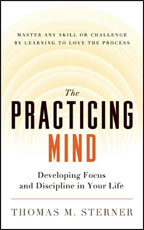When we use the word "practice," we may think of playing a piano, training for a big football game, or rehearsing for a dance performance. But, of course, we are practicing in other ways all day long. We practice how we relate to our loved ones, our animal companions, the natural world, our office co-workers; we practice how we eat. Thomas Sterner, a student of Eastern and Western philosophy, was trained as a jazz pianist. So quite a few of his insights into the practicing mind have their origin in the study of music.
It takes both patience and discipline to train our minds to focus on one thing. The practicing mind offers a means to stay in the present, to keep oneself process- rather than goal-oriented, and to use intention as a prod to deliberate actions. Searching for perfection is not the point of practice. Rather part of the process is changing our bad habits and creating patience through a change in our perception. A lot can happen in our lives when we tune in to the four "S" words: Simplify, Small, Short, and Slow. Equanimity is another game changer on the path of practice.
The more attention we give to the formal and informal, public and private practices in our days, the more wholehearted we become as flexible human beings caught up in both living and learning.
